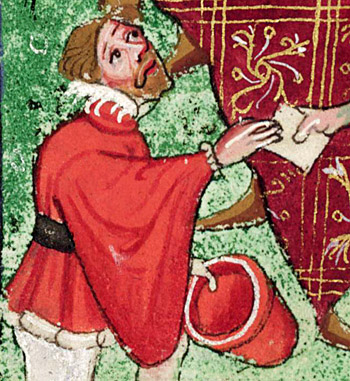Gest Historiale of the Destruction of Troy
General Information
Plot Summary

Prologue: Old stories of noble deeds sometimes disappear, and sometimes, like the story of Troy, are preserved in different versions. Some writers, like Guido della Colonna are reliable; some, like Homer, full of fantasies such as gods fighting. This account will be true and complete. Pelleas, envious of his nephew Jason's reputation, tricks him into the perilous quest for the Golden Fleece. Jason assembles a ship and famous crew. [Gap in manuscript: they land with peaceful intentions on the coast of Troy but are ordered to leave by a hostile King Laomedon. They vow to return and stay in spite of Trojan threats.] Jason and Hercules do not forget the Trojan insult and recruit other Greeks for a war against Troy. Hercules kills Laomedon and they plunder the city. They depart in triumph but from their cruelty come festering hatred and death. Laomedon's son Priam rebuilds Troy, a magnificent city.
Although he mourns the harm the Greeks have done, he and his council decide on a diplomatic mission, saying they will forget old quarrels for the return of Priam's sister, who is held in shameful servitude. The Greeks contemptuously reject the Trojan overtures. Priam and his council, over Hector's objections and the predictions of doom from Elinus and Cassandra, send Paris to take revenge. He returns with Helen, who, like all women, should have stayed at home. Agamemnon and Nestor urge Menelaus to stop weeping for Helen and take action. They summon all their Greek allies, described by Dares, who had often seen them, as well as their Trojan opponents. Over 1200 ships assemble. In Athens they agree to consult the oracle at Delphi, which predicts victory in the tenth year. Learning this, the Trojan Calchas joins the Greeks, advising and encouraging them. The Greeks begin their course of destruction, but there is fierce opposition. Agamemnon suggests they ask for the return of Helen. If Priam refuses then all the harm that follows will be the fault of the Trojans.
The mission is inevitably a failure, thanks to the deliberate rudeness of Ulysses and Diomedes. Both sides prepare for a long war. Advantage switches back and forth, and many die on both sides. Fighting before the walls of Troy is bloody and drawn out, as one great warrior and then another overcome foes. Relentless fighting is interrupted by truces. In the beginning Hector is triumphant, pillaging the Greek tents, but in a fit of misguided chivalry ends the battle when he might have permanently defeated his enemy. Calchas's daughter Briseis is ransomed from Troy, much to the grief of Troilus. Hector and Achilles agree to settle the conflict in single combat, but the Greeks refuse to allow it. Andromache dreams that Hector will die if he fights the next day. Persuaded by the pleas of his family he stays in Troy, until he learns of the death of a brother, and rushes out in a rage. Achilles realizes that until Hector is killed the Greeks will fail. Treacherously he spears him. All Troy mourns. The Greeks feel confident that now Troy will be taken easily, but their leaders begin quarrelling.
During a truce Achilles sees Polyxena weeping for her brother Hector and falls ill with love. He attempts to persuade the Greeks to leave, in exchange for the Trojan princess, but they refuse and he withdraws from the war, which continues unabated. The Trojans burn the Greek ships and the Greeks consider making peace, but Calchas convinces them victory will be theirs. Furious that the Trojans are beating his troops, Achilles returns to battle, killing Troilus. (Homer is wrong to praise Achilles). Paris and Ajax kill each other, to Helen's great grief. The Amazons arrive and at first beat back the Greeks but eventually their queen is killed and the Trojans retreat, outnumbered.
Trapped in Troy, Antenor and Aeneas plot to save themselves by betraying the city. The Greeks agree to save the traitors when Troy is destroyed. Although the Trojans fulfil their bargain, the theft of their guardian spirit, the Palladium, engineered by Antenor, guarantees their doom. [Gap in manuscript: Calchas advises the construction of the Trojan horse. The Greeks swear falsely to keep the peace.] Priam allows the entrance of the Trojan horse and the city is pillaged and destroyed. The now divided Greeks embark separately. The Trojan traitors eventually prosper. The Greeks endure many hardships, and many ships and their famed commanders are lost. Rumours and lies arrive with the returning Greeks, and some are exiled, like Diomedes, and some are killed like Agamemnon. The cycle of revenge and rivalry continues on to the next generations. 806,000 Greeks died at the siege of Troy as well as 600,706 Trojans and their allies.
Manuscripts
Click a title below to search for all romances in that manuscript.